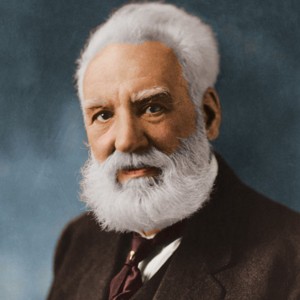We do quite a lot with police and partners and are increasingly being seen as the platform of choice for collaborative working and information sharing over secure government networks. As such I was delighted to be a guest presenter recently at the National Police Operational Requirements Board (ORB), chaired by Chief Constable Mike Barton. This body sets out the future policing requirements and contains all the key influencers around policing. Along with one of our many forward thinking customers, Caroline Simpson, National Coordinator for the Government Agency Intelligence Network (GAIN), we had the opportunity to share what works today and debate some of the challenges for the future.
Using the great entrepreneur and (debated) developer of one of the most successful systems in the world, Alexander Graham Bell*, I told our story about connecting law enforcement together.
We presented examples of how activity around Serious Organised Crime (SOC) can be joined up from national, regional, local delivery across the whole law enforcement network. We illustrated what works with customers today, and what could be done if there were a few tweaks to the system. Like the telephone in its day, this is powerful stuff, and would go a long way to drive a dent in the current costs of SOC which are said to be £24bn per annum. The same solution based approach can also address many other crime and public protection challenges. We and our customers are ready to go, but there are many barriers too. Some of the issues we debated at the event include:
- Connectivity: one of the 5Cs, but many policing and partner systems are just not joined up and its a foundation stone for cost effective sharing. Its one of the reasons why pam was developed to work over secure government networks and goes a long way to address those concerns.
- Standards: there is a real desire, and rightly so, to bring about consistent standards for police work, both in terms of performance quality but also how information/data/intelligence can be shared. Much work has been done on this already such as NIM Compliance standards but it’s a long path to success for others. Indeed some government standards harmonisation projects have been gone on for over 10 years. pam already brings about more consistency and higher standards for its users, and encourages sharing of best practices. It offers a cracking way to consolidate, improve and harmonise on the way.
- Agile development: We have proven over the past few years that acting intimately with customers in an agile ‘better than before’ manner has worked, and saved money on the way. Users quickly get access to changes in our software to test and learn from their requirements to see whether it makes a difference in days, not years. They have their own personal development team at their side. But there are challenges to this from a budget management perspective, and certainly procurement rules can stifle doing this on a grander scale. Its good to see some customers moving more towards outcome based contracting including grown up approaches to agile, and recent procurement legislation on innovation partnerships may also help in this area too (although it might not!)
- Procurement: When you are in a room with senior management, business users, technical experts and procurement staff, there are diverse views. And that can mean someone looking to find why it can’t be done instead of working together to find a way it can. Despite best intentions and rhetoric around innovation, encouraging small business in to work with government, procurement processes (and sometimes the people) get in the way of change. It was an interesting topic of debate and one that we certainly hope can be addressed in the future. Its not the only one, but is a massive barrier to delivering more value for customers, and sadly can drive up cost and slow time to benefit considerably. Whilst there are reports of GCloud saving 20% against legacy contracts, it is difficult to see what the opportunity cost might be from lower purchase prices in terms of outputs and outcomes. In our field these have much more significance when you think that a life lost costs around £1m. From a computing and ICT perspective you would naturally expect costs to drop and we have certainly been passing on those benefits to customers over the past 6 years. It will also stifle innovation and leads to questions about whether providers are prepared to share ideas in advance and work at risk.
There will always be risks in change, but there is a compelling need to change and doing nothing is not an option. Our existing work demonstrates that you can still make a difference despite the barriers, but it would be nice to see even more transformation as it can be done. In any event I’m pleased and proud we have been able to share our work with the ORB. It has laid some more foundations for what will aid the police and its partners to get better results together in future, at lower cost. Lets hope they can make it happen!
*sourced from wikipedia
